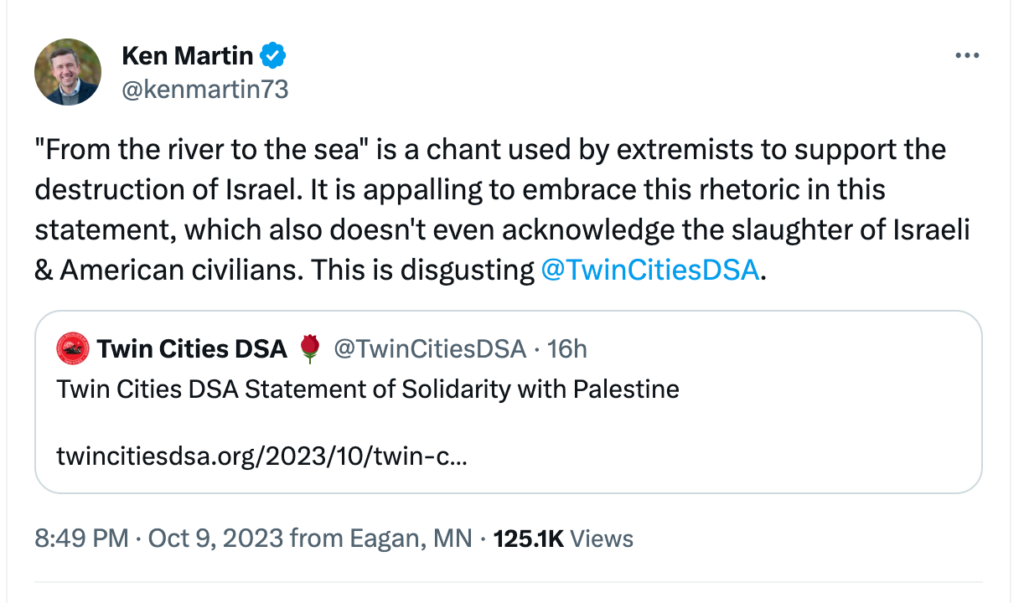Wake up! Hamas apologists sound just like MN ethnic studies activists
Apologists for Hamas are using very specific language in their attempt to shift blame for the heinous acts of terrorism committed against Israeli citizens this week. That same language is littered throughout Tim Walz’s draft social studies standards and benchmarks and embedded into the ethnic studies curriculum he is now forcing into every academic subject from kindergarten through high school.
Terms and concepts like “settler colonialism,” “decolonization” and “dispossession” appear numerous times in the social studies benchmarks, forming the baseline for how Walz and his allies hope to indoctrinate Minnesota students.
Listen to the young woman protester in New York yesterday blame the Israeli settlers for what happened:
“These festival goers are not innocent civilians, they are settlers,” she says. “So they deserved it?” she was asked. “Yes, every settler.”
Now read the statement put out yesterday by the Twin Cities chapter of the Democrat Socialists of America:
“We, the Twin Cities chapter of the Democratic Socialists of America, are heartbroken after watching 2 million Gazans live in the world’s largest open-air prison, where access to basic necessities like medical care and electricity are frequently denied to them by Israel. After seeing our Palestinian siblings be denied movement outside of the prison walls that encircle Gaza. After all the settler-colonial violence and dispossession.” After having to repeat that Muslim worshippers at the Al-Aqsa Masjid in Jerusalem have the right to pray and practice their religion without fear of Israeli police and settler violence, harassment, and intimidation. After watching US politicians on all sides of the political spectrum speak cautiously, or not at all, when Israeli settlers use colonial and apartheid laws of the Israeli state to force Palestinians from their homes and ancestral lands but speak with immense force and certainty about the Israeli state’s right to defend itself against Palestinians. After attempts at false equivalencies — when, since 1917, colonial and zionist settler states, and the world’s largest imperial powers, have used Palestine as a site of experimentation in war crimes and atrocities against Palestians simply seeking to live their lives. After seeing article after article about another Palestinian child being murdered by the IDF for simply existing in public. We are heartbroken.
We, the Twin Cities chapter of the Democratic Socialists of America, are also resolved. We are resolved in our fight to support the efforts of Palestinians, in Palestine and in the diaspora, in their efforts to free their people. Just as Palestinians took to the streets after George Floyd was murdered, we are resolved to show the same solidarity in defense of Palestinian liberation. We are resolved to build our capacity as a chapter to take our fight to city halls, to the state capitol, and to the halls of national power in the USA — to end all US financial support for the Israeli settler apartheid regime. We are resolved to strengthen ties between Indigenous movements, locally and across Turtle Island, and the anti-racist and anti-colonial international movement for Palestinian liberation. We are resolved to work toward rematriation of land in good relationship in the movements against the violent state and state-sponsored settler dispossession and mass killing of the Santee Dakhóta, the Anishinaabe, and other Native communities of present-day Minnesota. Justice for our Palestinian relatives can also unequivocally be named “Land Back”.
We are resolved to enshrine the right to freedom of movement in Palestine, in the USA, and around the globe, and to fight border fascism wherever it rears its hideous head. We are resolved to work to ensure that our own DSA chapter and nationally endorsed elected officials not only vote against military funding for Israeli settler-colonialism and apartheid, but also work towards the ending of US-sponsorship of Israeli occupation of Palestine. We are resolved in our commitment to not fear the backlash that comes from being vocally, and boldly, in favor of the Boycott, Divestment, and Sanctions (BDS) movement and Palestinian freedom, for as socialists and internationalists, we are often the only ones willing to take a stand for justice, even when it is unpopular, or even dangerous. We are resolved to proclaim “From the River, to the Sea, Palestine will be free!” today and until liberation.
The similarities in the language of this statement and the language of the social studies benchmarks are eerie in light of recent events. If it sounds like the same people are writing both, it’s because they are! The social studies standards committee appointed by Walz was dominated by people who share this Leftist ideology.
Settler colonialism appears in the standards eight different times in seven different benchmarks:
5.4.21.1 Explain the religious, political and economic reasons for the movement of people from Europe to the Americas and examine the impact of colonization and settler colonialism on Indigenous peoples.
6.4.18.2 Describe the varied and diverse interactions of Indigenous people, European/American traders and settler-colonists in the upper Mississippi River region. Examine how settler colonialism conflicted with Dakota and Anishinaabe ways of life.
9.4.18.9 U.S. History Era 2: Settler Colonialism and Atlantic Slavery. Evaluate European, Indigenous and African diasporic historical narratives about colonialism and slavery.
9.4.19.8 U.S. History Era 2: Settler Colonialism and Atlantic Slavery. Identify how Indigenous people built new coalitions and developed a diverse set of strategies in response to European settler colonialism. Examine how Indigenous perspectives and strategies may have changed over time.
9.4.20.8 U.S. History Era 2: Settler Colonialism and Atlantic Slavery. Investigate historical sources about colonialism, religion and slavery, asking who created them and whose interests were articulated or excluded. Analyze the ways in which the perspectives of those recording history shaped the history that they produced.
9.4.21.9 U.S. History Era 2: Settler Colonialism and Atlantic Slavery. Describe the ways that Indigenous peoples managed the environment before European colonialism. Examine the impact of capitalism on those ways of environmental management as well as global trade networks
9.4.22.8 U.S. History Era 2: Settler Colonialism and Atlantic Slavery. Examine the contemporary significance of foundational dates in U.S. history, specifically dates related to the founding of the North American colonies (1492, 1607, 1620), the development of the institution of slavery (1619) and the founding of the United States as an independent country (1776, 1789). Construct an argument using precise and knowledgeable claims, with evidence from multiple sources, about how one or more of these dates became memorialized in the 19th, 20th or 21st centuries.
Dispossession appears in the standards draft nine different times in six different benchmarks:
7.5.25.1 Examine the impact and memory of U.S. expansion and native dispossession today and how it’s memorialized.
9.4.18.11 U.S. History Era 4: Imperial Expansion and Native Dispossession. Evaluate historical narratives about U.S. imperial expansion, native dispossession, specifically Indian Removal, Manifest Destiny and Indigenous perspectives.
9.4.19.10 U.S. History Era 4: Imperial Expansion and Native Dispossession. Identify and analyze Mexican, Asian, African American and/or Indigenous perspectives on the Mexican War, the Louisiana Purchase, Texas, the Gold Rush, the transcontinental railroad and/or other U.S. territorial acquisition strategies.
9.4.20.10 U.S. History Era 4: Imperial Expansion and Native Dispossession. Interpret multiple primary or secondary sources to understand and analyze the perspectives of individuals and communities who were affected by and/or participated in imperial expansion and Native Dispossession, including Indigenous, Mexican, Black and/or Asian perspectives.
9.4.21.11 U.S. History Era 4: Imperial Expansion and Native Dispossession. Critique the central argument in secondary historical sources about the Industrial Revolution and its relationship to new technologies, accelerated expansion, capitalist growth, slavery and/or colonialism.
9.4.22.10 U.S. History Era 4: Imperial Expansion and Native Dispossession. Compare historical memorialization of “pioneers” and frontiers versus dispossession and homelands.
Decolonization appears in a ninth-grade benchmark:
9.4.21.7 World History Era 6: The New Global Era (1900–Present). Analyze multiple and complex causes and effects of decolonization and independence movements in the 20th and 21st centuries.
Notice how yesterday’s statement from the DSA very specifically connected Palestinians to “Santee Dakhóta, the Anishinaabe, and other Native communities of present-day Minnesota.” That would make present day Minnesotans the “settlers.”
The standards and benchmarks include a new Ethnic Studies strand and the 2023 legislature passed a new mandate forcing schools to offer an Ethnic Studies course at the high school level and embed ethnic studies throughout the entire curriculum, from kindergarten through high school. The author of the Ethnic Studies bill in the House was Rep. Samantha Sencer-Mura, who (as pointed out by my colleague Bill Glahn) was endorsed by the Democrat Socialists of America during her last campaign.

As the saying goes, when someone tells you who they are, believe them.
The DSA statement was so offensive even DFL Party Chairman Ken Martin had to issue a rebuke:

It’s a good start but If Martin was truly concerned about the totality of the DSA statement, he would petition Gov. Walz and Lt. Gov. Flanagan to send the current anti-American social studies benchmarks back to the drawing board. He won’t.
Minnesotans need to understand the language of the DSA is the same language repeated throughout the social studies benchmarks that Tim Walz’s Department of Education is about to adopt. Center of the American Experiment has been shouting from the rooftops (most recently here) for three years about the dangerous language being inserted into Tim Walz’s social studies standards, benchmarks and ethnic studies curriculum mandates. That language is coming to life as these Minnesota Marxists react to Hamas’ brutal attacks on the citizens of Israel.
Minnesota parents and citizens need to connect the dots and demand change.